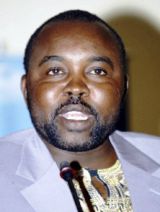Optimism as Darfur peace talks resume in Nigeria
By Estelle Shirbon
ABUJA, June 10 (Reuters) – A new round of talks aimed at ending a two-year conflict in Sudan’s Darfur region began in Nigeria on Friday with both sides cautiously optimistic about chances for a deal.

|
|
SLM leader Abdelwahed Mohamed A-Nur |
At stake is an elusive settlement of a dispute that has killed tens of thousands of people and driven more than two million from their homes into teeming refugee camps inside Sudan and across the border in Chad.
Delegates from the Sudanese government and two rebel groups spelled out their positions at a ceremony to launch the negotiations at an Abuja hotel, as did mediators headed by the African Union.
“The positive thing they (the rebels) said was that they are committed to reaching peace during this round. That is the most important thing they mentioned,” Majzoub al-Khalifa, head of the government negotiating team, told Reuters after the ceremony.
Rebels launched their uprising in the vast desert region in early 2003 against what they said was marginalisation by the federal government. Khartoum responded by backing Arab militia to drive non-Arabs from their villages.
The United States has called the ensuing campaign of killing, rape and arson genocide. The United Nations says it has created one of the world’s worst humanitarian crises.
Four previous rounds of talks in Abuja ended in stalemate.
Abdel Wahed Mohamed al-Nur, head of the Sudan Liberation Army (SLA), used his speech to reiterate criticism of the government and to list the movement’s demands.
These included bringing refugees home, separation of religion and state, devolution of power to the regions, an end to ethnic oppression, justice for war criminals, land rights for Darfur tribes and boundary changes.
RHETORIC
“The speech was aggressive and hostile but that is the rhetoric of negotiation,” Abdelrahman Musa Abakar, political adviser to Nur, told Reuters after the ceremony.
“In fact there are good intentions from both parts. The government is trying to reconcile with us. The language is more polished than before. For the first time the government called us ‘brothers in Darfur’ and not ‘rebels’,” he said.
The parties said they would tackle immediate issues such as restoring security for Darfur’s people as well as longer-term questions such as power-sharing arrangements in the region.
The Darfur talks come in the wake of a separate peace deal reached by the government in January with different rebel groups in the south of the country, ending a 20-year civil war.
They also follow an announcement from the International Criminal Court that it has launched a war crimes probe believed to target some Sudanese government and government-linked militias — a new development that could induce Khartoum’s negotiators to try harder for a deal this time.
The African Union, which has about 3,000 troops in Darfur, says Khartoum has stopped military flights over Darfur and shown restraint in clashes with rebels in the past two months.
But despite these improvements, divisions on the rebel side could jeopardize the new round of talks. Militia from the SLA and smaller rebel group the Justice and Equality Movement (JEM) have clashed in Darfur in the run-up to the talks.
In addition, JEM leader Khalil Ibrahim has fallen out with mediators from Chad. In his speech, Ibrahim said the JEM rejected Chad as a mediator, accusing the country of siding with the Sudanese government and being a “peace spoiler.”
A team from Chad slated to mediate in the Abuja talks stayed behind in N’Djamena on Friday. The official reason was a problem with travel arrangements, though a diplomatic source said the team objected to Ibrahim’s leadership of JEM at the talks.
(Additional reporting by Camillus Eboh in Abuja and Betel Miarom in N’Djamena)
